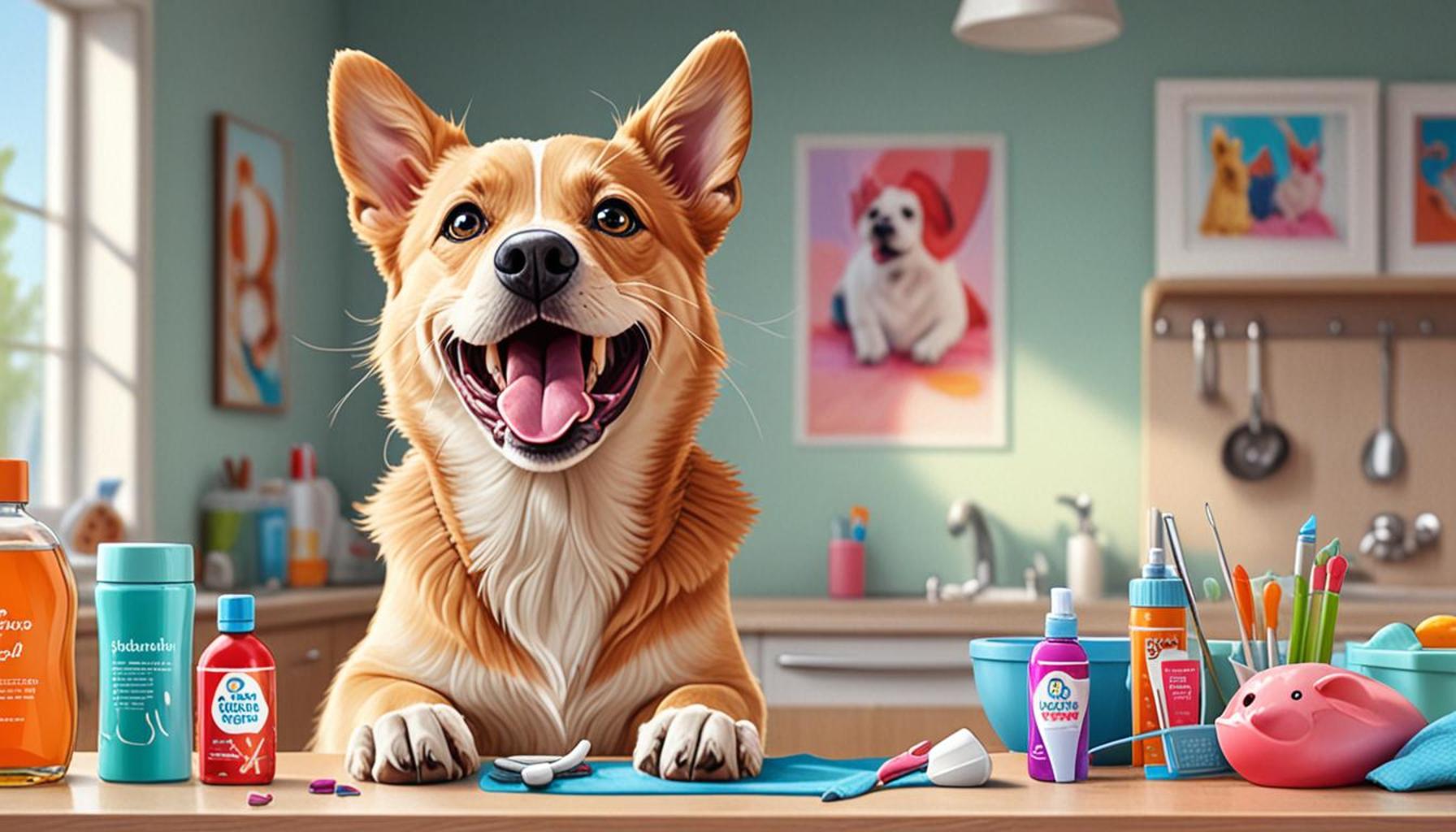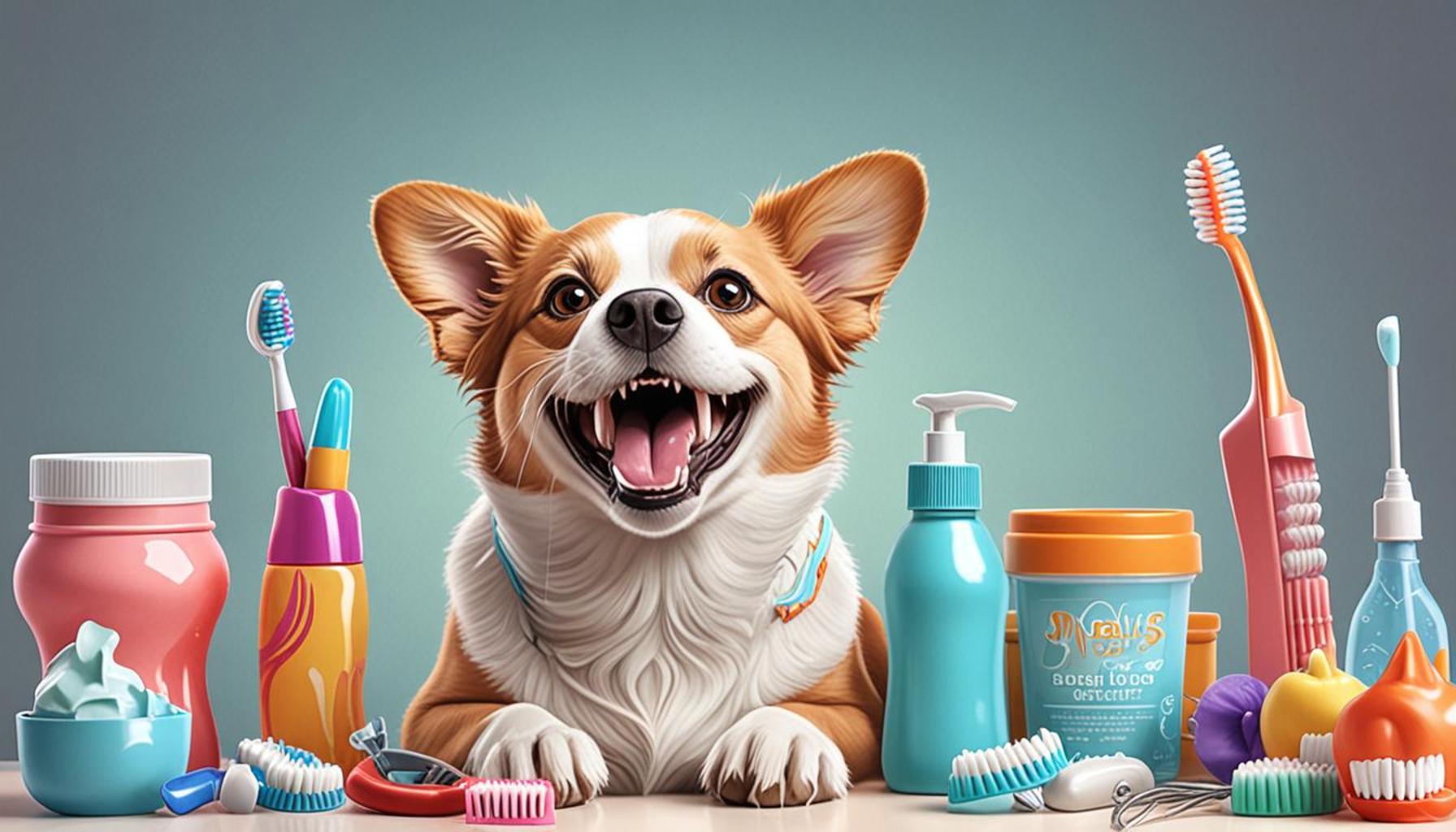Preventive Care Tips for Pet Dental Health

The Importance of Pet Dental Care
Many pet owners overlook a crucial aspect of their furry friends’ health: dental care. Just like humans, pets can suffer from dental diseases that lead to discomfort and serious health complications. Understanding how to maintain your pet’s dental hygiene is essential for their overall well-being. It’s a common misconception that only older pets face dental issues, but in reality, both young and old pets are susceptible to tooth decay and gum disease. This is why a proactive approach to dental health can significantly impact your pet’s quality of life.
Regular preventive care can save you from costly treatments and ensure your pet stays happy. Here are some key benefits of focusing on pet dental health:
- Prevents Oral Diseases: Routine care such as brushing, professional dental cleanings, and regular check-ups help avoid periodontal disease and other serious conditions that can develop silently. According to the American Veterinary Medical Association, approximately 80% of dogs and 70% of cats show signs of dental disease by the age of three.
- Promotes Fresh Breath: A clean mouth translates to fresher breath, which can enhance the bond with your pet. Bad breath is often the first sign of dental problems, and addressing this issue can make interpersonal interactions with your pet much more pleasant.
- Improves Overall Health: Dental issues can lead to more severe health problems. Bacteria from infected gums can enter the bloodstream, affecting vital organs such as the heart, liver, and kidneys. Maintaining your pet’s dental health isn’t just about their mouth; it’s a critical component of their overall health.
Furthermore, many pet owners may not realize that there are simple steps they can incorporate into their pet’s routine to promote better oral health. For example, regular brushing using toothpaste specifically formulated for pets can dramatically reduce plaque build-up. Additionally, chew toys and dental treats can help clean teeth and massage gums, providing dual benefits of fun and care.
Veterinarians recommend scheduling dental check-ups as part of your pet’s regular health care, closely akin to vaccinations and annual wellness exams. Early detection of dental issues can lead to less invasive treatment options and a better prognosis for recovery.
In this article, we will explore effective preventive care tips that can help keep your pet’s teeth healthy. Prepare to uncover practical advice that can make a significant difference in your pet’s dental care routine and potentially enhance their longevity! Taking these steps can be a game changer, ensuring that your beloved companion leads a happy, healthy life.

DISCOVER MORE: Click here to learn about innovative pet training techniques
Essential Preventive Care Tips for Your Pet’s Dental Health
Maintaining your pet’s dental health requires consistent effort and awareness of best practices. The journey toward healthier teeth and gums starts with simple daily habits that pet owners can easily incorporate into their pets’ routines. Here are some vital preventive care tips that can make a significant difference in ensuring your pet’s dental hygiene remains in top shape:
- Daily Brushing: Just as humans benefit from brushing their teeth twice a day, pets do too. Using a pet-specific toothpaste (never use human toothpaste, as it can be harmful) and a soft-bristled toothbrush, aim to brush your pet’s teeth daily or at least several times a week. This routine helps remove plaque before it hardens into tartar, which can lead to more serious dental issues.
- Routine Veterinary Check-ups: Regular visits to the veterinarian are crucial. Vets can perform thorough dental examinations and professional cleanings that can reach areas you might miss at home. These check-ups can also identify problems early on, making treatment easier and more effective.
- Dental Chews and Toys: Incorporating dental chews and toys into your pet’s playtime can be fun while also promoting oral hygiene. Look for products that are designed to reduce tartar and freshen breath. These can provide a satisfying chewing experience while combating plaque buildup. Be sure to choose appropriate products for your pet’s size and chewing strength.
- Dietary Considerations: Just like with humans, diet plays a role in oral health. Feeding your pet high-quality, balanced food can help maintain strong, healthy teeth. Additionally, certain pet foods are specifically formulated to support dental health, helping reduce tartar buildup.
- Water Additives: Consider using dental water additives that you can mix into your pet’s drinking water. These products contain enzymes to help reduce plaque and control bad breath while being safe for daily use. Consulting your veterinarian for recommendations can ensure you’re using effective products.
While these preventive measures may seem simple, they play a critical role in your pet’s overall health. By committing to these habits early on, you can avoid significant dental issues that may arise later in life. Keeping your pet’s mouth healthy not only prevents painful conditions but also contributes to their happiness and longevity.
Furthermore, educating yourself about the signs of dental disease—such as difficulty eating, swollen gums, or persistent bad breath—can enable early diagnosis and treatment. Be proactive and attentive, and your pet will thank you for a lifetime of smiles and health.
| Dental Hygiene Practices | Impact on Overall Health |
|---|---|
| Regular Tooth Brushing | Reduces the risk of periodontal disease and other health issues. |
| Dental Treats and Chews | Promotes mechanical cleaning and reduces plaque build-up. |
| Regular Vet Check-ups | Ensures early detection of dental issues, enhancing longevity. |
| Dietary Considerations | A balanced diet can strengthen teeth and gums, improving health. |
Taking the necessary steps in preventive care for your pet’s dental health goes beyond brushing and dietary adjustments. Regular vet visits can help identify dental diseases beforehand, preventing serious complications. Incorporating dental-friendly treats and chews into your pet’s diet serves a dual purpose: they not only provide enjoyment for your furry friend but also actively combat plaque formation. Interestingly, studies suggest that the oral health of pets directly correlates with their overall health. Untreated dental problems can lead to significant health issues, including heart disease, as bacteria from the mouth enter the bloodstream. Therefore, prioritizing dental care can enhance not just your pet’s mouth but their long-lasting vitality. With proper attention and routine practices, you can make a significant difference. Wouldn’t you want to ensure your pet’s happiness and health?
DISCOVER MORE: Click here for insights on homemade pet nutrition
Creative Approaches to Enhance Your Pet’s Dental Care
Taking care of your pet’s dental health goes beyond basic brushing and regular vet visits; it can also be an engaging and interactive part of your and your pet’s daily routine. By introducing creative approaches, you not only keep your pet’s teeth clean but also make dental care an enjoyable experience. Here are some innovative tactics to further improve your pet’s dental hygiene:
- Incorporate Dental Games: Engage your pet in games that promote oral health. For instance, consider playing fetch with a dental ball or hiding treats inside a dental puzzle toy. Both activities motivate your pet to chew, which helps scrape away plaque. In addition, these mental challenges keep your pet mentally stimulated, enhancing their overall wellbeing.
- Flavored Toothpaste: If your pet is resistant to traditional brushing, experiment with flavored toothpaste options tailored for pets. Many pets are more responsive to chicken, beef, or peanut butter-flavored toothpaste, making the brushing experience more enjoyable. Try different flavors to see which one your pet prefers and watch their willingness to participate in dental care blossom.
- Use Finger Brushes: If a toothbrush seems intimidating for your pet, consider using a finger brush. These brushes slip over your finger and allow for better maneuverability, making them easier to use on pets who are apprehensive about traditional toothbrushes. This approach offers both comfort for your pet and a more thorough cleaning experience.
- Teach Oral Health Commands: Reinforcing good dental habits can be as simple as incorporating commands into your training routine. Teaching your pet commands like “open” or “smile,” can make the process of checking their teeth more manageable. This approach builds familiarity and trust during dental care, making it a stress-free experience for both pet and owner.
- Regularity is Key: Establish a structured schedule for dental care routines. Just as feeding times are consistent, so should be dental routines. Incorporate oral hygiene practices into your daily schedule, and over time, it will become a natural part of your pet’s lifestyle. Consistency not only reinforces the habit but also helps your pet anticipate and cooperate during these sessions.
Furthermore, exploring natural remedies can be beneficial as part of a comprehensive dental care plan. Some pet owners advocate for the use of organic dental gels or supplements containing ingredients such as aloe vera or coconut oil, which are believed to support oral health naturally. However, it’s essential to consult with your veterinarian before introducing any new products to ensure these are safe and effective for your specific pet.
Paying attention to your pet’s dental hygiene can have far-reaching implications. Evidence suggests that poor dental health can lead to serious health issues such as heart, liver, and kidney problems. By adopting a multi-faceted approach to preventive care, you can significantly boost your pet’s oral health, increase their longevity, and enhance their quality of life.
Incorporating a variety of methods into your pet’s dental care routine not only keeps their teeth and gums in optimal condition but also enriches the bond you share. A healthy mouth equates to a healthy pet, setting the stage for many joyful years ahead.
DISCOVER MORE: Click here to learn about the crucial role of socialization
Conclusion: Embrace Proactive Pet Dental Care
In summary, ensuring your pet’s dental health is a vital aspect of their overall wellbeing, directly impacting their longevity and quality of life. By prioritizing preventive care, you can prevent serious dental problems that could lead to more extensive health issues, including heart and kidney complications. The strategies we’ve explored—from incorporating dental games and utilizing flavored toothpaste to establishing a regular dental care schedule—help create a holistic approach that is both engaging and effective.
It’s crucial to remember that consistency is key; integrating these practices into your daily routine not only makes dental hygiene a habit but also fosters a deeper bond between you and your pet. For instance, playing games that involve retrieving a dental chew can make brushing your pet’s teeth feel like playtime rather than a chore. Also, opting for toothpaste formulated specifically for pets, which comes in flavors like peanut butter or chicken, can turn the task into a rewarding experience for your furry friend.
Moreover, always consider consulting with your veterinarian about innovative dental care products or natural remedies that may suit your pet’s specific needs. Dental gels, water additives, and special veterinary-approved treats can complement your home care routine and help maintain optimal oral health.
As you embark on this journey toward better dental care, remember that even small, consistent efforts can yield significant benefits. A happy, healthy smile leads to a happier pet, which, in turn, leads to a happier home. Start today by implementing these preventive care tips for your furry companion, and observe the remarkable difference in their health, energy levels, and overall joy. In doing so, you set the foundation for a lifetime of well-being, ensuring they thrive with vitality and happiness for years to come.


